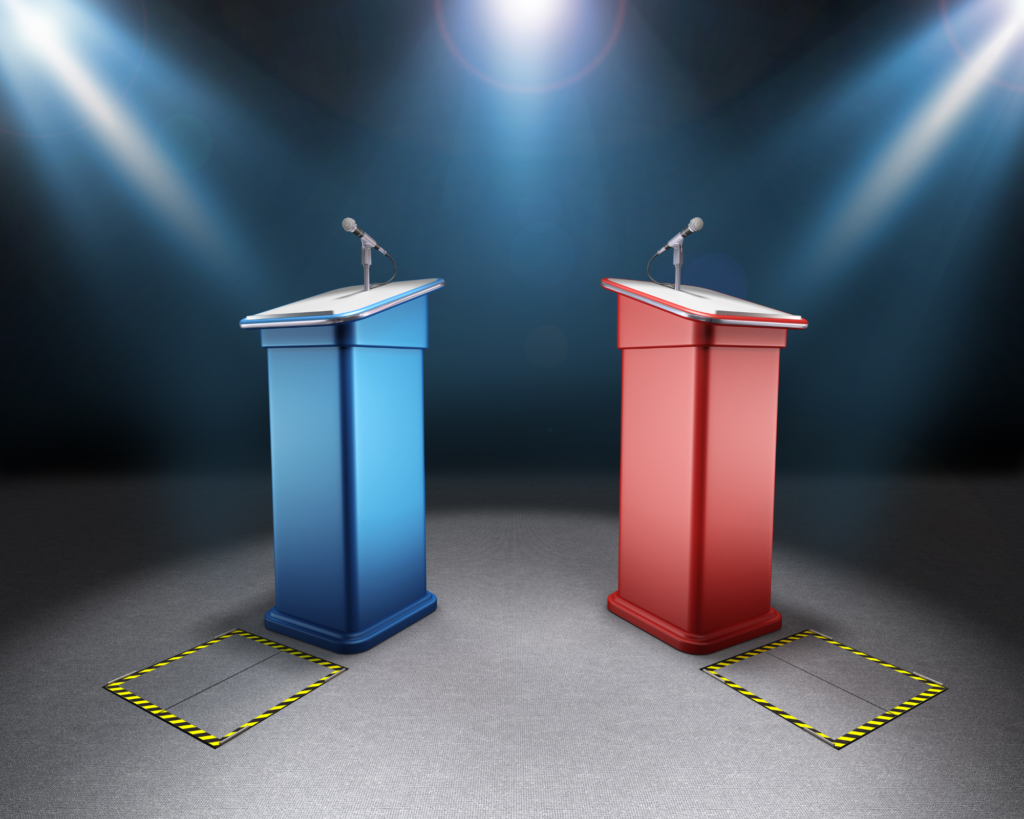
Since 1960, televised debates have become a staple in US elections. That was the year when presidential candidates John F. Kennedy and Richard Nixon faced off in their first of four televised debates. But that tradition is starting to fade. In Middle Tennessee, there are currently no debates scheduled for any of the congressional races or the governor’s race.
Republican Gov. Bill Lee and Democrat Jason Martin are going head-to-head in this fall’s gubernatorial race, but they have yet to meet face to face. At an appearance last week, Martin made it clear he’s eager to do so.
“Gov. Bill Lee, I hope you’re listening. I think the people of Tennessee deserve an opportunity to have a discussion about your record, a respectful discussion about what we can do better in this state,” Martin said.
Lee has yet to commit to a debate, according to his campaign.
“There are currently no plans,” said Lee’s campaign communications director, Laine Arnold.
But that doesn’t mean he’s not campaigning. In fact, he just released his first TV ad.
This isn’t a new trend; incumbents have skipped debating in previous elections. But George Washington University political science professor Ethan Porter thinks it’s a strategy based on unfounded fears.
“They seem to believe that the debates are make or break. That’s rarely the case. Although, I suppose sometimes it can be,” said Porter.
Porter says, while it’s rare, some candidates have made big news by their mistakes during a live debate.
Take for example, in 2016, when then-Republican presidential candidate Sen. Marco Rubio repeated the same phrase several times in a row.
“Let’s dispel once and for all this fiction that Barack Obama doesn’t know what he’s doing. He knows exactly what he’s doing,” Rubio said.
Then minutes later he started again, “But I would add this: Let’s dispel once and for all this fiction that Barack Obama doesn’t know what he’s doing. He knows exactly what he’s doing.”
The unflattering clip quickly went viral. But Porter says usually debates do go as planned.
“More often than not, two candidates debate. Everyone’s a little better informed for having seen the debate, and the persuasive effects are pretty minor,” Porter said.
But still, it’s largely Republican candidates not yet committed to take the stage this cycle. Take Middle Tennessee’s three newly drawn congressional districts — 5, 6 and 7. In each, Republican candidates have not made plans to debate.
Their democratic opponents, however, have all welcomed a debate. In District 7, candidate Odessa Kelly, a progressive Democrat, thinks it does a disservice to the new voters in this district.
“It’s unfair that he will not. He’s too scared to have a debate with me so that the people have agreed to have an opportunity to know and hear from the people who are trying to be their representation in Congress,” Kelly said.
Congressman Mark Green did not return WPLN’s request for comment over whether he would debate Kelly.
In District 5, Republican candidate Andy Ogles has not responded to invitations to debates or most media interviews, including WPLN News. But he did take the time to speak with conservative radio show host Dan Mandis on 99.7 earlier this week, where he partially explained why.
“I know what this district wants. And talking to some liberal media over at NPR or whatever, isn’t going to win this race. Talking to real people is, and that’s what we’re doing,” Ogles said.
And Ogles’ strategy of avoiding debates might work, according to University of Tennessee political science professor Richard Pacelle.
“Their hope is — I’m sure — that in an off-year election, that the moderates don’t show up,” Pacelle said. “And so, if they don’t show up, ‘we won’t pay too much of a price. They’re not going to cost us with our base, and we’re going to lose those other people as well.'”
It’s not just moderate voters who lose out, Pacelle says. Without debates, voters will have to do their own research to form an opinion on the candidates and who should represent them for the next four years in Congress and in the governor’s mansion.

